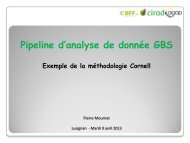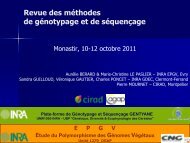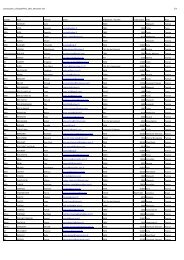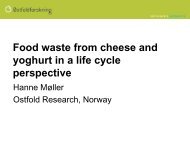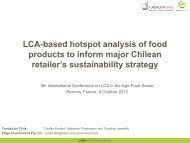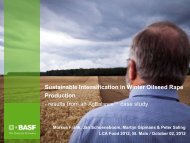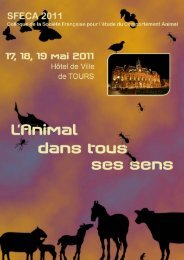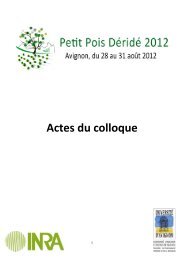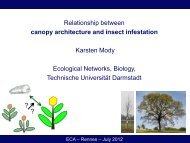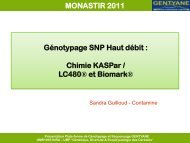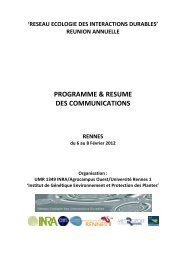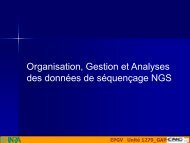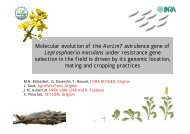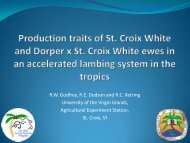- Page 1 and 2:
colloque.inra.fr/lcafood2012 Procee
- Page 3 and 4:
Please cite this publication as: Co
- Page 5 and 6:
Welcome ii Soyez les bienvenus à L
- Page 7 and 8:
Programme Overview Room color code:
- Page 9 and 10:
General Information 8 th Internatio
- Page 11 and 12:
Table of Contents for Sessions TUES
- Page 13 and 14:
8 th International Conference on LC
- Page 15 and 16:
8 th International Conference on LC
- Page 17 and 18:
8 th International Conference on LC
- Page 19 and 20:
8 th International Conference on LC
- Page 21 and 22:
8 th International Conference on LC
- Page 23 and 24:
ORAL SESSIONS 8 th International Co
- Page 25 and 26:
KEYNOTE SESSION 8 th Int. Conferenc
- Page 27 and 28:
KEYNOTE SESSION 8 th Int. Conferenc
- Page 29 and 30:
KEYNOTE SESSION 8 th Int. Conferenc
- Page 31 and 32:
KEYNOTE SESSION 8 th Int. Conferenc
- Page 33 and 34:
KEYNOTE SESSION 8 th Int. Conferenc
- Page 35 and 36:
KEYNOTE SESSION 8 th Int. Conferenc
- Page 37 and 38:
KEYNOTE SESSION 8 th Int. Conferenc
- Page 39 and 40:
KEYNOTE SESSION 8 th Int. Conferenc
- Page 41 and 42:
KEYNOTE SESSION 8 th Int. Conferenc
- Page 43 and 44:
KEYNOTE SESSION 8 th Int. Conferenc
- Page 45 and 46:
KEYNOTE SESSION 8 th Int. Conferenc
- Page 47 and 48:
KEYNOTE SESSION 8 th Int. Conferenc
- Page 49 and 50:
KEYNOTE SESSION 8 th Int. Conferenc
- Page 51 and 52:
KEYNOTE SESSION 8 th Int. Conferenc
- Page 53 and 54:
KEYNOTE SESSION 8 th Int. Conferenc
- Page 55 and 56:
KEYNOTE SESSION 8 th Int. Conferenc
- Page 57 and 58:
KEYNOTE SESSION 8 th Int. Conferenc
- Page 59 and 60:
KEYNOTE SESSION 8 th Int. Conferenc
- Page 61 and 62:
KEYNOTE SESSION 8 th Int. Conferenc
- Page 63 and 64:
KEYNOTE SESSION 8 th Int. Conferenc
- Page 65 and 66:
PARALLEL SESSION 1A: WATER FOOTPRIN
- Page 67 and 68:
PARALLEL SESSION 1A: WATER FOOTPRIN
- Page 69 and 70:
PARALLEL SESSION 1A: WATER FOOTPRIN
- Page 71 and 72:
PARALLEL SESSION 1A: WATER FOOTPRIN
- Page 73 and 74:
PARALLEL SESSION 1A: WATER FOOTPRIN
- Page 75 and 76:
PARALLEL SESSION 1A: WATER FOOTPRIN
- Page 77 and 78:
PARALLEL SESSION 1A: WATER FOOTPRIN
- Page 79 and 80:
PARALLEL SESSION 1A: WATER FOOTPRIN
- Page 81 and 82:
PARALLEL SESSION 1A: WATER FOOTPRIN
- Page 83 and 84:
PARALLEL SESSION 1A: WATER FOOTPRIN
- Page 85 and 86:
PARALLEL SESSION 1B: TOWARDS LIFE C
- Page 87 and 88:
PARALLEL SESSION 1B: TOWARDS LIFE C
- Page 89 and 90:
PARALLEL SESSION 1B: TOWARDS LIFE C
- Page 91 and 92:
PARALLEL SESSION 1B: TOWARDS LIFE C
- Page 93 and 94:
PARALLEL SESSION 1B: TOWARDS LIFE C
- Page 95 and 96:
PARALLEL SESSION 1B: TOWARDS LIFE C
- Page 97 and 98:
PARALLEL SESSION 1B: TOWARDS LIFE C
- Page 99 and 100:
PARALLEL SESSION 1B: TOWARDS LIFE C
- Page 101 and 102:
PARALLEL SESSION 1B: TOWARDS LIFE C
- Page 103 and 104:
PARALLEL SESSION 1B: TOWARDS LIFE C
- Page 105 and 106:
PARALLEL SESSION 1B: TOWARDS LIFE C
- Page 107 and 108:
PARALLEL SESSION 1B: TOWARDS LIFE C
- Page 109 and 110:
PARALLEL SESSION 1C: ECODESIGN AND
- Page 111 and 112:
PARALLEL SESSION 1C: ECODESIGN AND
- Page 113 and 114:
PARALLEL SESSION 1C: ECODESIGN AND
- Page 115 and 116:
PARALLEL SESSION 1C: ECODESIGN AND
- Page 117 and 118:
PARALLEL SESSION 1C: ECODESIGN AND
- Page 119 and 120:
PARALLEL SESSION 1C: ECODESIGN AND
- Page 121 and 122:
PARALLEL SESSION 1C: ECODESIGN AND
- Page 123 and 124:
PARALLEL SESSION 1C: ECODESIGN AND
- Page 125 and 126:
PARALLEL SESSION 1C: ECODESIGN AND
- Page 127 and 128:
PLENARY SESSION 1: FOOD 8 th Int. C
- Page 129 and 130:
PLENARY SESSION 1: FOOD 8 th Int. C
- Page 131 and 132:
PLENARY SESSION 1: FOOD 8 th Int. C
- Page 133 and 134:
PLENARY SESSION 1: FOOD 8 th Int. C
- Page 135 and 136:
PLENARY SESSION 1: FOOD 8 th Int. C
- Page 137 and 138:
PLENARY SESSION 1: FOOD 8 th Int. C
- Page 139 and 140:
PLENARY SESSION 1: FOOD 8 th Int. C
- Page 141 and 142:
PLENARY SESSION 1: FOOD 8 th Int. C
- Page 143 and 144:
PLENARY SESSION 1: FOOD 8 th Int. C
- Page 145 and 146:
PLENARY SESSION 1: FOOD 8 th Int. C
- Page 147 and 148:
PLENARY SESSION 1: FOOD 8 th Int. C
- Page 149 and 150:
PLENARY SESSION 1: FOOD 8 th Int. C
- Page 151 and 152:
PARALLEL SESSION 2A: LAND USE 8 th
- Page 153 and 154:
PARALLEL SESSION 2A: LAND USE 8 th
- Page 155 and 156:
PARALLEL SESSION 2A: LAND USE 8 th
- Page 157 and 158:
PARALLEL SESSION 2A: LAND USE 8 th
- Page 159 and 160:
PARALLEL SESSION 2A: LAND USE 8 th
- Page 161 and 162:
PARALLEL SESSION 2A: LAND USE 8 th
- Page 163 and 164:
PARALLEL SESSION 2A: LAND USE 8 th
- Page 165 and 166:
PARALLEL SESSION 2A: LAND USE 8 th
- Page 167 and 168:
PARALLEL SESSION 2A: LAND USE 8 th
- Page 169 and 170:
PARALLEL SESSION 2A: LAND USE 8 th
- Page 171 and 172:
PARALLEL SESSION 2A: LAND USE 8 th
- Page 173 and 174:
PARALLEL SESSION 2A: LAND USE 8 th
- Page 175 and 176:
PARALLEL SESSION 2A: LAND USE 8 th
- Page 177 and 178:
PARALLEL SESSION 2A: LAND USE 8 th
- Page 179 and 180:
PARALLEL SESSION 2B: EMISSIONS MODE
- Page 181 and 182:
PARALLEL SESSION 2B: EMISSIONS MODE
- Page 183 and 184:
PARALLEL SESSION 2B: EMISSIONS MODE
- Page 185 and 186:
PARALLEL SESSION 2B: EMISSIONS MODE
- Page 187 and 188:
PARALLEL SESSION 2B: EMISSIONS MODE
- Page 189 and 190:
PARALLEL SESSION 2B: EMISSIONS MODE
- Page 191 and 192:
PARALLEL SESSION 2B: EMISSIONS MODE
- Page 193 and 194:
PARALLEL SESSION 2B: EMISSIONS MODE
- Page 195 and 196:
PARALLEL SESSION 2B: EMISSIONS MODE
- Page 197 and 198:
PARALLEL SESSION 2B: EMISSIONS MODE
- Page 199 and 200:
PARALLEL SESSION 2B: EMISSIONS MODE
- Page 201 and 202:
PARALLEL SESSION 2B: EMISSIONS MODE
- Page 203 and 204:
PARALLEL SESSION 2B: EMISSIONS MODE
- Page 205 and 206:
PARALLEL SESSION 2B: EMISSIONS MODE
- Page 207 and 208:
PARALLEL SESSION 2C: QUANTIFICATION
- Page 209 and 210:
PARALLEL SESSION 2C: QUANTIFICATION
- Page 211 and 212:
PARALLEL SESSION 2C: QUANTIFICATION
- Page 213 and 214:
PARALLEL SESSION 2C: QUANTIFICATION
- Page 215 and 216:
PARALLEL SESSION 2C: QUANTIFICATION
- Page 217 and 218:
PARALLEL SESSION 2C: QUANTIFICATION
- Page 219 and 220:
PARALLEL SESSION 2C: QUANTIFICATION
- Page 221 and 222:
PARALLEL SESSION 2C: QUANTIFICATION
- Page 223 and 224:
PARALLEL SESSION 2C: QUANTIFICATION
- Page 225 and 226:
PARALLEL SESSION 2C: QUANTIFICATION
- Page 227 and 228:
PARALLEL SESSION 2C: QUANTIFICATION
- Page 229 and 230:
PARALLEL SESSION 2C: QUANTIFICATION
- Page 231 and 232:
PARALLEL SESSION 2C: QUANTIFICATION
- Page 233 and 234:
PLENARY SESSION 2: METHODOLOGICAL C
- Page 235 and 236:
PLENARY SESSION 2: METHODOLOGICAL C
- Page 237 and 238:
PLENARY SESSION 2: METHODOLOGICAL C
- Page 239 and 240:
PLENARY SESSION 2: METHODOLOGICAL C
- Page 241 and 242:
PLENARY SESSION 2: METHODOLOGICAL C
- Page 243 and 244:
PLENARY SESSION 2: METHODOLOGICAL C
- Page 245 and 246:
PLENARY SESSION 2: METHODOLOGICAL C
- Page 247 and 248:
PLENARY SESSION 2: METHODOLOGICAL C
- Page 249 and 250:
PLENARY SESSION 2: METHODOLOGICAL C
- Page 251 and 252:
PLENARY SESSION 2: METHODOLOGICAL C
- Page 253 and 254:
PLENARY SESSION 2: METHODOLOGICAL C
- Page 255 and 256:
PLENARY SESSION 2: METHODOLOGICAL C
- Page 257 and 258:
PLENARY SESSION 2: METHODOLOGICAL C
- Page 259 and 260:
PLENARY SESSION 2: METHODOLOGICAL C
- Page 261 and 262:
PLENARY SESSION 2: METHODOLOGICAL C
- Page 263 and 264:
PARALLEL SESSION 3A: LAND USE CHANG
- Page 265 and 266:
PARALLEL SESSION 3A: LAND USE CHANG
- Page 267 and 268:
PARALLEL SESSION 3A: LAND USE CHANG
- Page 269 and 270:
PARALLEL SESSION 3A: LAND USE CHANG
- Page 271 and 272:
PARALLEL SESSION 3A: LAND USE CHANG
- Page 273 and 274:
PARALLEL SESSION 3A: LAND USE CHANG
- Page 275 and 276:
PARALLEL SESSION 3A: LAND USE CHANG
- Page 277 and 278:
PARALLEL SESSION 3A: LAND USE CHANG
- Page 279 and 280:
PARALLEL SESSION 3A: LAND USE CHANG
- Page 281 and 282:
PARALLEL SESSION 3A: LAND USE CHANG
- Page 283 and 284:
PARALLEL SESSION 3A: LAND USE CHANG
- Page 285 and 286:
PARALLEL SESSION 3A: LAND USE CHANG
- Page 287 and 288:
PARALLEL SESSION 3A: LAND USE CHANG
- Page 289 and 290:
PARALLEL SESSION 3A: LAND USE CHANG
- Page 291 and 292:
PARALLEL SESSION 3A: LAND USE CHANG
- Page 293 and 294:
PARALLEL SESSION 3A: LAND USE CHANG
- Page 295 and 296:
PARALLEL SESSION 3A: LAND USE CHANG
- Page 297 and 298:
PARALLEL SESSION 3B: PACKAGING 8 th
- Page 299 and 300:
PARALLEL SESSION 3B: PACKAGING 8 th
- Page 301 and 302:
PARALLEL SESSION 3B: PACKAGING 8 th
- Page 303 and 304:
PARALLEL SESSION 3B: PACKAGING 8 th
- Page 305 and 306:
PARALLEL SESSION 3B: PACKAGING 8 th
- Page 307 and 308:
PARALLEL SESSION 3B: PACKAGING 8 th
- Page 309 and 310:
PARALLEL SESSION 3B: PACKAGING 8 th
- Page 311 and 312:
PARALLEL SESSION 3B: PACKAGING 8 th
- Page 313 and 314:
PARALLEL SESSION 3B: PACKAGING 8 th
- Page 315 and 316:
PARALLEL SESSION 3B: PACKAGING 8 th
- Page 317 and 318:
PARALLEL SESSION 3B: PACKAGING 8 th
- Page 319 and 320:
PARALLEL SESSION 3B: PACKAGING 8 th
- Page 321 and 322:
PARALLEL SESSION 3B: PACKAGING 8 th
- Page 323 and 324:
PARALLEL SESSION 3B: PACKAGING 8 th
- Page 325 and 326:
PARALLEL SESSION 3B: PACKAGING 8 th
- Page 327 and 328:
PARALLEL SESSION 3C: SHEEP AND DAIR
- Page 329 and 330:
PARALLEL SESSION 3C: SHEEP AND DAIR
- Page 331 and 332:
PARALLEL SESSION 3C: SHEEP AND DAIR
- Page 333 and 334:
PARALLEL SESSION 3C: SHEEP AND DAIR
- Page 335 and 336:
PARALLEL SESSION 3C: SHEEP AND DAIR
- Page 337 and 338:
PARALLEL SESSION 3C: SHEEP AND DAIR
- Page 339 and 340:
PARALLEL SESSION 3C: SHEEP AND DAIR
- Page 341 and 342:
PARALLEL SESSION 3C: SHEEP AND DAIR
- Page 343 and 344:
PARALLEL SESSION 3C: SHEEP AND DAIR
- Page 345 and 346:
PARALLEL SESSION 3C: SHEEP AND DAIR
- Page 347 and 348:
PARALLEL SESSION 3C: SHEEP AND DAIR
- Page 349 and 350:
PARALLEL SESSION 3C: SHEEP AND DAIR
- Page 351 and 352:
PARALLEL SESSION 3C: SHEEP AND DAIR
- Page 353 and 354:
PARALLEL SESSION 3C: SHEEP AND DAIR
- Page 355 and 356:
PARALLEL SESSION 3C: SHEEP AND DAIR
- Page 357 and 358:
PARALLEL SESSION 3C: SHEEP AND DAIR
- Page 359 and 360:
PARALLEL SESSION 3C: SHEEP AND DAIR
- Page 361 and 362:
PLENARY SESSION 3: METHODS FOR BIOD
- Page 363 and 364:
PLENARY SESSION 3: METHODS FOR BIOD
- Page 365 and 366:
PLENARY SESSION 3: METHODS FOR BIOD
- Page 367 and 368:
PLENARY SESSION 3: METHODS FOR BIOD
- Page 369 and 370:
PLENARY SESSION 3: METHODS FOR BIOD
- Page 371 and 372:
PLENARY SESSION 3: METHODS FOR BIOD
- Page 373 and 374:
PLENARY SESSION 3: METHODS FOR BIOD
- Page 375 and 376:
PLENARY SESSION 3: METHODS FOR BIOD
- Page 377 and 378:
PARALLEL SESSION 4A: CARBON FOOTPRI
- Page 379 and 380:
PARALLEL SESSION 4A: CARBON FOOTPRI
- Page 381 and 382:
PARALLEL SESSION 4A: CARBON FOOTPRI
- Page 383 and 384:
PARALLEL SESSION 4A: CARBON FOOTPRI
- Page 385 and 386:
PARALLEL SESSION 4A: CARBON FOOTPRI
- Page 387 and 388:
PARALLEL SESSION 4A: CARBON FOOTPRI
- Page 389 and 390:
PARALLEL SESSION 4A: CARBON FOOTPRI
- Page 391 and 392:
PARALLEL SESSION 4A: CARBON FOOTPRI
- Page 393 and 394:
PARALLEL SESSION 4A: CARBON FOOTPRI
- Page 395 and 396:
PARALLEL SESSION 4A: CARBON FOOTPRI
- Page 397 and 398:
PARALLEL SESSION 4A: CARBON FOOTPRI
- Page 399 and 400:
PARALLEL SESSION 4A: CARBON FOOTPRI
- Page 401 and 402:
PARALLEL SESSION 4B: DIET 8 th Int.
- Page 403 and 404:
PARALLEL SESSION 4B: DIET 8 th Int.
- Page 405 and 406:
PARALLEL SESSION 4B: DIET 8 th Int.
- Page 407 and 408:
PARALLEL SESSION 4B: DIET 8 th Int.
- Page 409 and 410:
PARALLEL SESSION 4B: DIET 8 th Int.
- Page 411 and 412:
PARALLEL SESSION 4B: DIET 8 th Int.
- Page 413 and 414:
PARALLEL SESSION 4B: DIET 8 th Int.
- Page 415 and 416:
PARALLEL SESSION 4B: DIET 8 th Int.
- Page 417 and 418:
PARALLEL SESSION 4B: DIET 8 th Int.
- Page 419 and 420:
PARALLEL SESSION 4B: DIET 8 th Int.
- Page 421 and 422:
PARALLEL SESSION 4B: DIET 8 th Int.
- Page 423 and 424:
PARALLEL SESSION 4B: DIET 8 th Int.
- Page 425 and 426:
PARALLEL SESSION 4B: DIET 8 th Int.
- Page 427 and 428:
PARALLEL SESSION 4B: DIET 8 th Int.
- Page 429 and 430:
PARALLEL SESSION 4B: DIET 8 th Int.
- Page 431 and 432:
PARALLEL SESSION 4C: CROP PRODUCTIO
- Page 433 and 434:
PARALLEL SESSION 4C: CROP PRODUCTIO
- Page 435 and 436:
PARALLEL SESSION 4C: CROP PRODUCTIO
- Page 437 and 438:
PARALLEL SESSION 4C: CROP PRODUCTIO
- Page 439 and 440:
PARALLEL SESSION 4C: CROP PRODUCTIO
- Page 441 and 442:
PARALLEL SESSION 4C: CROP PRODUCTIO
- Page 443 and 444:
PARALLEL SESSION 4C: CROP PRODUCTIO
- Page 445 and 446:
PARALLEL SESSION 4C: CROP PRODUCTIO
- Page 447 and 448:
PARALLEL SESSION 4C: CROP PRODUCTIO
- Page 449 and 450:
PARALLEL SESSION 4C: CROP PRODUCTIO
- Page 451 and 452:
PARALLEL SESSION 4C: CROP PRODUCTIO
- Page 453 and 454:
PARALLEL SESSION 4C: CROP PRODUCTIO
- Page 455 and 456:
PARALLEL SESSION 5A: FOOD LABELLING
- Page 457 and 458:
PARALLEL SESSION 5A: FOOD LABELLING
- Page 459 and 460:
PARALLEL SESSION 5A: FOOD LABELLING
- Page 461 and 462:
PARALLEL SESSION 5A: FOOD LABELLING
- Page 463 and 464:
PARALLEL SESSION 5A: FOOD LABELLING
- Page 465 and 466:
PARALLEL SESSION 5A: FOOD LABELLING
- Page 467 and 468:
PARALLEL SESSION 5A: FOOD LABELLING
- Page 469 and 470:
PARALLEL SESSION 5A: FOOD LABELLING
- Page 471 and 472:
PARALLEL SESSION 5A: FOOD LABELLING
- Page 473 and 474:
PARALLEL SESSION 5A: FOOD LABELLING
- Page 475 and 476:
PARALLEL SESSION 5A: FOOD LABELLING
- Page 477 and 478:
PARALLEL SESSION 5A: FOOD LABELLING
- Page 479 and 480:
PARALLEL SESSION 5A: FOOD LABELLING
- Page 481 and 482:
PARALLEL SESSION 5B: METHODOLOGICAL
- Page 483 and 484:
PARALLEL SESSION 5B: METHODOLOGICAL
- Page 485 and 486:
PARALLEL SESSION 5B: METHODOLOGICAL
- Page 487 and 488:
PARALLEL SESSION 5B: METHODOLOGICAL
- Page 489 and 490:
PARALLEL SESSION 5B: METHODOLOGICAL
- Page 491 and 492:
PARALLEL SESSION 5B: METHODOLOGICAL
- Page 493 and 494:
PARALLEL SESSION 5B: METHODOLOGICAL
- Page 495 and 496:
PARALLEL SESSION 5B: METHODOLOGICAL
- Page 497 and 498:
PARALLEL SESSION 5B: METHODOLOGICAL
- Page 499 and 500:
PARALLEL SESSION 5B: METHODOLOGICAL
- Page 501 and 502:
PARALLEL SESSION 6A: TOOLS AND DATA
- Page 503 and 504:
PARALLEL SESSION 6A: TOOLS AND DATA
- Page 505 and 506:
PARALLEL SESSION 6A: TOOLS AND DATA
- Page 507 and 508:
PARALLEL SESSION 6A: TOOLS AND DATA
- Page 509 and 510:
PARALLEL SESSION 6A: TOOLS AND DATA
- Page 511 and 512:
PARALLEL SESSION 6A: TOOLS AND DATA
- Page 513 and 514:
PARALLEL SESSION 6A: TOOLS AND DATA
- Page 515 and 516:
PARALLEL SESSION 6A: TOOLS AND DATA
- Page 517 and 518:
PARALLEL SESSION 6A: TOOLS AND DATA
- Page 519 and 520:
PARALLEL SESSION 6A: TOOLS AND DATA
- Page 521 and 522:
PARALLEL SESSION 6A: TOOLS AND DATA
- Page 523 and 524:
PARALLEL SESSION 6A: TOOLS AND DATA
- Page 525 and 526:
PARALLEL SESSION 6A: TOOLS AND DATA
- Page 527 and 528:
PARALLEL SESSION 6A: TOOLS AND DATA
- Page 529 and 530:
PARALLEL SESSION 6B: FISHIERIES, SO
- Page 531 and 532:
PARALLEL SESSION 6B: FISHIERIES, SO
- Page 533 and 534:
PARALLEL SESSION 6B: FISHIERIES, SO
- Page 535 and 536:
PARALLEL SESSION 6B: FISHIERIES, SO
- Page 537 and 538:
PARALLEL SESSION 6B: FISHIERIES, SO
- Page 539 and 540:
PARALLEL SESSION 6B: FISHIERIES, SO
- Page 541 and 542:
PARALLEL SESSION 6B: FISHIERIES, SO
- Page 543 and 544:
PARALLEL SESSION 6B: FISHIERIES, SO
- Page 545 and 546:
PARALLEL SESSION 6B: FISHIERIES, SO
- Page 547 and 548:
PARALLEL SESSION 6B: FISHIERIES, SO
- Page 549 and 550:
PARALLEL SESSION 6B: FISHIERIES, SO
- Page 551 and 552:
PARALLEL SESSION 6B: FISHIERIES, SO
- Page 553 and 554:
PARALLEL SESSION 6B: FISHIERIES, SO
- Page 555 and 556:
PARALLEL SESSION 6B: FISHIERIES, SO
- Page 557 and 558:
PARALLEL SESSION 6B: FISHIERIES, SO
- Page 559 and 560:
PARALLEL SESSION 6B: FISHIERIES, SO
- Page 561 and 562:
PARALLEL SESSION 6B: FISHIERIES, SO
- Page 563 and 564:
PARALLEL SESSION 6C: POULTRY AND PO
- Page 565 and 566:
PARALLEL SESSION 6C: POULTRY AND PO
- Page 567 and 568:
PARALLEL SESSION 6C: POULTRY AND PO
- Page 569 and 570:
PARALLEL SESSION 6C: POULTRY AND PO
- Page 571 and 572:
PARALLEL SESSION 6C: POULTRY AND PO
- Page 573 and 574:
PARALLEL SESSION 6C: POULTRY AND PO
- Page 575 and 576:
PARALLEL SESSION 6C: POULTRY AND PO
- Page 577 and 578:
PARALLEL SESSION 6C: POULTRY AND PO
- Page 579 and 580:
PARALLEL SESSION 6C: POULTRY AND PO
- Page 581 and 582:
PARALLEL SESSION 6C: POULTRY AND PO
- Page 583 and 584:
PARALLEL SESSION 6C: POULTRY AND PO
- Page 585 and 586:
PARALLEL SESSION 6C: POULTRY AND PO
- Page 587 and 588:
PARALLEL SESSION 6C: POULTRY AND PO
- Page 589 and 590:
PARALLEL SESSION 6C: POULTRY AND PO
- Page 591 and 592:
PARALLEL SESSION 6C: POULTRY AND PO
- Page 593 and 594:
PARALLEL SESSION 6C: POULTRY AND PO
- Page 595 and 596:
PARALLEL SESSION 7A: CONSUMERS 8 th
- Page 597 and 598:
PARALLEL SESSION 7A: CONSUMERS 8 th
- Page 599 and 600:
PARALLEL SESSION 7A: CONSUMERS 8 th
- Page 601 and 602:
PARALLEL SESSION 7A: CONSUMERS 8 th
- Page 603 and 604:
PARALLEL SESSION 7A: CONSUMERS 8 th
- Page 605 and 606:
PARALLEL SESSION 7A: CONSUMERS 8 th
- Page 607 and 608:
PARALLEL SESSION 7A: CONSUMERS 8 th
- Page 609 and 610:
PARALLEL SESSION 7A: CONSUMERS 8 th
- Page 611 and 612:
PARALLEL SESSION 7A: CONSUMERS 8 th
- Page 613 and 614:
PARALLEL SESSION 7A: CONSUMERS 8 th
- Page 615 and 616:
PARALLEL SESSION 7A: CONSUMERS 8 th
- Page 617 and 618:
PARALLEL SESSION 7A: CONSUMERS 8 th
- Page 619 and 620:
PARALLEL SESSION 7A: CONSUMERS 8 th
- Page 621 and 622:
PARALLEL SESSION 7B: BEEF PRODUCTIO
- Page 623 and 624:
PARALLEL SESSION 7B: BEEF PRODUCTIO
- Page 625 and 626:
PARALLEL SESSION 7B: BEEF PRODUCTIO
- Page 627 and 628:
PARALLEL SESSION 7B: BEEF PRODUCTIO
- Page 629 and 630:
PARALLEL SESSION 7B: BEEF PRODUCTIO
- Page 631 and 632:
PARALLEL SESSION 7B: BEEF PRODUCTIO
- Page 633 and 634:
PARALLEL SESSION 7B: BEEF PRODUCTIO
- Page 635 and 636:
PARALLEL SESSION 7B: BEEF PRODUCTIO
- Page 637 and 638:
PARALLEL SESSION 7B: BEEF PRODUCTIO
- Page 639 and 640:
PARALLEL SESSION 7B: BEEF PRODUCTIO
- Page 641 and 642:
PARALLEL SESSION 7B: BEEF PRODUCTIO
- Page 643 and 644:
PARALLEL SESSION 7C: FOOD CHAIN AND
- Page 645 and 646:
PARALLEL SESSION 7C: FOOD CHAIN AND
- Page 647 and 648:
PARALLEL SESSION 7C: FOOD CHAIN AND
- Page 649 and 650:
PARALLEL SESSION 7C: FOOD CHAIN AND
- Page 651 and 652:
PARALLEL SESSION 7C: FOOD CHAIN AND
- Page 653 and 654:
PARALLEL SESSION 7C: FOOD CHAIN AND
- Page 655 and 656:
PARALLEL SESSION 7C: FOOD CHAIN AND
- Page 657 and 658:
PARALLEL SESSION 7C: FOOD CHAIN AND
- Page 659 and 660:
PARALLEL SESSION 7C: FOOD CHAIN AND
- Page 661 and 662:
PARALLEL SESSION 7C: FOOD CHAIN AND
- Page 663 and 664:
PARALLEL SESSION 7C: FOOD CHAIN AND
- Page 665 and 666:
PARALLEL SESSION 7C: FOOD CHAIN AND
- Page 667 and 668:
PARALLEL SESSION 7C: FOOD CHAIN AND
- Page 669 and 670: PARALLEL SESSION 7C: FOOD CHAIN AND
- Page 671 and 672: POSTER SESSIONS 8 th International
- Page 673 and 674: GROUP 1, SESSION A: ANIMAL PRODUCTI
- Page 675 and 676: GROUP 1, SESSION A: ANIMAL PRODUCTI
- Page 677 and 678: GROUP 1, SESSION A: ANIMAL PRODUCTI
- Page 679 and 680: GROUP 1, SESSION A: ANIMAL PRODUCTI
- Page 681 and 682: GROUP 1, SESSION A: ANIMAL PRODUCTI
- Page 683 and 684: GROUP 1, SESSION A: ANIMAL PRODUCTI
- Page 685 and 686: GROUP 1, SESSION A: ANIMAL PRODUCTI
- Page 687 and 688: GROUP 1, SESSION A: ANIMAL PRODUCTI
- Page 689 and 690: GROUP 1, SESSION A: ANIMAL PRODUCTI
- Page 691 and 692: GROUP 1, SESSION A: ANIMAL PRODUCTI
- Page 693 and 694: GROUP 1, SESSION A: ANIMAL PRODUCTI
- Page 695 and 696: GROUP 1, SESSION A: ANIMAL PRODUCTI
- Page 697 and 698: GROUP 1, SESSION A: ANIMAL PRODUCTI
- Page 699 and 700: GROUP 1, SESSION A: ANIMAL PRODUCTI
- Page 701 and 702: GROUP 1, SESSION A: ANIMAL PRODUCTI
- Page 703 and 704: GROUP 1, SESSION A: ANIMAL PRODUCTI
- Page 705 and 706: GROUP 1, SESSION A: ANIMAL PRODUCTI
- Page 707 and 708: GROUP 1, SESSION A: ANIMAL PRODUCTI
- Page 709 and 710: GROUP 1, SESSION A: ANIMAL PRODUCTI
- Page 711 and 712: GROUP 1, SESSION A: ANIMAL PRODUCTI
- Page 713 and 714: GROUP 1, SESSION A: ANIMAL PRODUCTI
- Page 715 and 716: GROUP 1, SESSION A: ANIMAL PRODUCTI
- Page 717 and 718: GROUP 1, SESSION A: ANIMAL PRODUCTI
- Page 719: GROUP 1, SESSION A: ANIMAL PRODUCTI
- Page 723 and 724: GROUP 1, SESSION A: ANIMAL PRODUCTI
- Page 725 and 726: GROUP 1, SESSION A: ANIMAL PRODUCTI
- Page 727 and 728: GROUP 1, SESSION A: ANIMAL PRODUCTI
- Page 729 and 730: GROUP 1, SESSION A: ANIMAL PRODUCTI
- Page 731 and 732: GROUP 1, SESSION A: ANIMAL PRODUCTI
- Page 733 and 734: GROUP 1, SESSION A: ANIMAL PRODUCTI
- Page 735 and 736: GROUP 2, SESSION A: CARBON OR WATER
- Page 737 and 738: GROUP 2, SESSION A: CARBON OR WATER
- Page 739 and 740: GROUP 2, SESSION A: CARBON OR WATER
- Page 741 and 742: GROUP 2, SESSION A: CARBON OR WATER
- Page 743 and 744: GROUP 2, SESSION A: CARBON OR WATER
- Page 745 and 746: GROUP 2, SESSION A: CARBON OR WATER
- Page 747 and 748: GROUP 2, SESSION A: CARBON OR WATER
- Page 749 and 750: GROUP 2, SESSION A: CARBON OR WATER
- Page 751 and 752: GROUP 2, SESSION A: CARBON OR WATER
- Page 753 and 754: GROUP 2, SESSION A: CARBON OR WATER
- Page 755 and 756: GROUP 2, SESSION A: CARBON OR WATER
- Page 757 and 758: GROUP 2, SESSION A: CARBON OR WATER
- Page 759 and 760: GROUP 2, SESSION A: CARBON OR WATER
- Page 761 and 762: GROUP 2, SESSION A: CARBON OR WATER
- Page 763 and 764: GROUP 2, SESSION A: CARBON OR WATER
- Page 765 and 766: GROUP 2, SESSION A: CARBON OR WATER
- Page 767 and 768: GROUP 2, SESSION A: CARBON OR WATER
- Page 769 and 770: GROUP 2, SESSION A: CARBON OR WATER
- Page 771 and 772:
GROUP 2, SESSION A: CARBON OR WATER
- Page 773 and 774:
GROUP 2, SESSION A: CARBON OR WATER
- Page 775 and 776:
GROUP 2, SESSION A: CARBON OR WATER
- Page 777 and 778:
GROUP 2, SESSION A: CARBON OR WATER
- Page 779 and 780:
GROUP 2, SESSION A: CARBON OR WATER
- Page 781 and 782:
GROUP 3, SESSION A: LABELLING, CONS
- Page 783 and 784:
GROUP 3, SESSION A: LABELLING, CONS
- Page 785 and 786:
GROUP 3, SESSION A: LABELLING, CONS
- Page 787 and 788:
GROUP 3, SESSION A: LABELLING, CONS
- Page 789 and 790:
GROUP 3, SESSION A: LABELLING, CONS
- Page 791 and 792:
GROUP 3, SESSION A: LABELLING, CONS
- Page 793 and 794:
GROUP 3, SESSION A: LABELLING, CONS
- Page 795 and 796:
GROUP 3, SESSION A: LABELLING, CONS
- Page 797 and 798:
GROUP 3, SESSION A: LABELLING, CONS
- Page 799 and 800:
GROUP 3, SESSION A: LABELLING, CONS
- Page 801 and 802:
GROUP 3, SESSION A: LABELLING, CONS
- Page 803 and 804:
GROUP 3, SESSION A: LABELLING, CONS
- Page 805 and 806:
GROUP 3, SESSION A: LABELLING, CONS
- Page 807 and 808:
GROUP 3, SESSION A: LABELLING, CONS
- Page 809 and 810:
GROUP 3, SESSION A: LABELLING, CONS
- Page 811 and 812:
GROUP 3, SESSION A: LABELLING, CONS
- Page 813 and 814:
GROUP 3, SESSION A: LABELLING, CONS
- Page 815 and 816:
GROUP 3, SESSION A: LABELLING, CONS
- Page 817 and 818:
GROUP 3, SESSION A: LABELLING, CONS
- Page 819 and 820:
GROUP 4, SESSION B: CROP PRODUCTION
- Page 821 and 822:
GROUP 4, SESSION B: CROP PRODUCTION
- Page 823 and 824:
GROUP 4, SESSION B: CROP PRODUCTION
- Page 825 and 826:
GROUP 4, SESSION B: CROP PRODUCTION
- Page 827 and 828:
GROUP 4, SESSION B: CROP PRODUCTION
- Page 829 and 830:
GROUP 4, SESSION B: CROP PRODUCTION
- Page 831 and 832:
GROUP 4, SESSION B: CROP PRODUCTION
- Page 833 and 834:
GROUP 4, SESSION B: CROP PRODUCTION
- Page 835 and 836:
GROUP 4, SESSION B: CROP PRODUCTION
- Page 837 and 838:
GROUP 4, SESSION B: CROP PRODUCTION
- Page 839 and 840:
GROUP 4, SESSION B: CROP PRODUCTION
- Page 841 and 842:
GROUP 4, SESSION B: CROP PRODUCTION
- Page 843 and 844:
GROUP 4, SESSION B: CROP PRODUCTION
- Page 845 and 846:
GROUP 4, SESSION B: CROP PRODUCTION
- Page 847 and 848:
GROUP 4, SESSION B: CROP PRODUCTION
- Page 849 and 850:
GROUP 4, SESSION B: CROP PRODUCTION
- Page 851 and 852:
GROUP 4, SESSION B: CROP PRODUCTION
- Page 853 and 854:
GROUP 4, SESSION B: CROP PRODUCTION
- Page 855 and 856:
GROUP 4, SESSION B: CROP PRODUCTION
- Page 857 and 858:
GROUP 4, SESSION B: CROP PRODUCTION
- Page 859 and 860:
GROUP 4, SESSION B: CROP PRODUCTION
- Page 861 and 862:
GROUP 4, SESSION B: CROP PRODUCTION
- Page 863 and 864:
GROUP 4, SESSION B: CROP PRODUCTION
- Page 865 and 866:
GROUP 5, SESSION B: FOOD PRODUCTS 8
- Page 867 and 868:
GROUP 5, SESSION B: FOOD PRODUCTS 8
- Page 869 and 870:
GROUP 5, SESSION B: FOOD PRODUCTS 8
- Page 871 and 872:
GROUP 5, SESSION B: FOOD PRODUCTS 8
- Page 873 and 874:
GROUP 5, SESSION B: FOOD PRODUCTS 8
- Page 875 and 876:
GROUP 5, SESSION B: FOOD PRODUCTS 8
- Page 877 and 878:
GROUP 5, SESSION B: FOOD PRODUCTS 8
- Page 879 and 880:
GROUP 5, SESSION B: FOOD PRODUCTS 8
- Page 881 and 882:
GROUP 5, SESSION B: FOOD PRODUCTS 8
- Page 883 and 884:
GROUP 5, SESSION B: FOOD PRODUCTS 8
- Page 885 and 886:
GROUP 5, SESSION B: FOOD PRODUCTS 8
- Page 887 and 888:
GROUP 5, SESSION B: FOOD PRODUCTS 8
- Page 889 and 890:
GROUP 5, SESSION B: FOOD PRODUCTS 8
- Page 891 and 892:
GROUP 5, SESSION B: FOOD PRODUCTS 8
- Page 893 and 894:
GROUP 5, SESSION B: FOOD PRODUCTS 8
- Page 895 and 896:
GROUP 5, SESSION B: FOOD PRODUCTS 8
- Page 897 and 898:
GROUP 5, SESSION B: FOOD PRODUCTS 8
- Page 899 and 900:
GROUP 5, SESSION B: FOOD PRODUCTS 8
- Page 901 and 902:
GROUP 5, SESSION B: FOOD PRODUCTS 8
- Page 903 and 904:
GROUP 5, SESSION B: FOOD PRODUCTS 8
- Page 905 and 906:
GROUP 5, SESSION B: FOOD PRODUCTS 8
- Page 907 and 908:
GROUP 5, SESSION B: FOOD PRODUCTS 8
- Page 909 and 910:
GROUP 6, SESSION B: METHODS, TOOLS,
- Page 911 and 912:
GROUP 6, SESSION B: METHODS, TOOLS,
- Page 913 and 914:
GROUP 6, SESSION B: METHODS, TOOLS,
- Page 915 and 916:
GROUP 6, SESSION B: METHODS, TOOLS,
- Page 917 and 918:
GROUP 6, SESSION B: METHODS, TOOLS,
- Page 919 and 920:
GROUP 6, SESSION B: METHODS, TOOLS,
- Page 921 and 922:
GROUP 6, SESSION B: METHODS, TOOLS,
- Page 923 and 924:
GROUP 6, SESSION B: METHODS, TOOLS,
- Page 925 and 926:
GROUP 6, SESSION B: METHODS, TOOLS,
- Page 927 and 928:
GROUP 6, SESSION B: METHODS, TOOLS,
- Page 929 and 930:
GROUP 6, SESSION B: METHODS, TOOLS,
- Page 931 and 932:
GROUP 6, SESSION B: METHODS, TOOLS,
- Page 933 and 934:
GROUP 6, SESSION B: METHODS, TOOLS,
- Page 935 and 936:
GROUP 6, SESSION B: METHODS, TOOLS,
- Page 937 and 938:
GROUP 6, SESSION B: METHODS, TOOLS,
- Page 939 and 940:
GROUP 6, SESSION B: METHODS, TOOLS,
- Page 941 and 942:
GROUP 6, SESSION B: METHODS, TOOLS,
- Page 943 and 944:
GROUP 6, SESSION B: METHODS, TOOLS,
- Page 945 and 946:
GROUP 6, SESSION B: METHODS, TOOLS,
- Page 947 and 948:
GROUP 6, SESSION B: METHODS, TOOLS,
- Page 949 and 950:
GROUP 6, SESSION B: METHODS, TOOLS,
- Page 951 and 952:
GROUP 6, SESSION B: METHODS, TOOLS,
- Page 953 and 954:
GROUP 6, SESSION B: METHODS, TOOLS,
- Page 955 and 956:
GROUP 6, SESSION B: METHODS, TOOLS,
- Page 957 and 958:
GROUP 6, SESSION B: METHODS, TOOLS,
- Page 959 and 960:
GROUP 6, SESSION B: METHODS, TOOLS,




